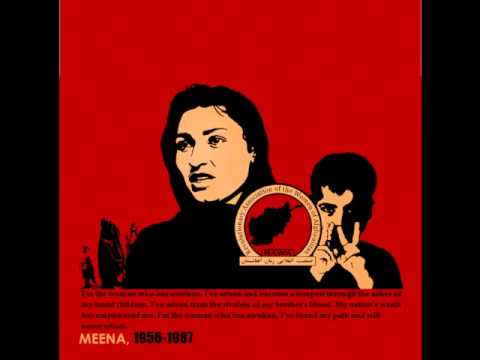Hotline: +381 61 63 84 071
International women’s day in Krnjaca

Meena Keshwar Kamal, founder of Revolutionary Association of the Women of Afghanistan RAWA
INTERNATIONAL WOMEN’S DAY IN KRNjACA
International Women’s Day, which is marked on March 8 in the western world, is only known as Mother’s Day in Afghanistan. In all the major cities of this country, known for the constant flow of refugees who are coming to Europe in the last several years, Mother’s Day is marked with flowers gifted to mothers, while women's rights and freedoms are completely neglected. NGO Atina’s activists talked about International Women's Day, gender equality and feminism, with residents of the asylum center in Krnjaca during the workshop “March 8 in Krnjaca”.
None of the participants of the workshop had heard of “feminism” before, although the word exists in their, Persian, language. They have heard of women’s rights, and knew abut the right to work, education, choice of a partner, and right to vote in political election.
The conversation became much more animated on the topic of freedom of clothing, the right to choose a partner, the right to termination of marriage, the right to equality. These women from Afghanistan are familiar with the fact that the laws guarantee all their rights, but they claim that, in practice, it all depends on the family. “The family is the sole authority to a woman, marriage is merely a change of authority,” one of them said.
A teacher from Afghanistan, who attended the workshop, said that in her city it is normal for the family to decide for the daughter not to go to school, and that women cannot do anything against such decisions. Also, a woman usually has no impact on what she will wear, or where she will live. All this is decided by the family, and later by her husband.
The most heated debate occurred on the topic of the right to choose a partner, and the right to termination of marriage. Some of the participants stated that it is possible to freely choose a partner, but that this choice means nothing if the family decides otherwise. Most of the women stated that arranged marriages are the only possible way to marry. A husband decides on divorce, not a wife. Children, as a rule, remain with their father and mothers often have no contact with children after divorce.
When asked whether they would report violence, all the women said that it is a huge risk to report such cases to the police. “If you survive your husband's violence, you can report it. If the husband finds out about that before you report it to the police, he will surely kill you,” one participant said. The report itself, on the other hand, does not necessarily mean protection, and participants said it was necessary to “bribe the court and other institutions” to provide them with adequate protection.
Since 1911, when March 8 was marked as the International Women's Day for the first time until today, the position of women in our society has undoubtedly improved. However, gender differences are still a part of our everyday lives, and the struggle for equality continues. This struggle is especially tested in circumstances of care for women and children who come from societies such as, for example, the one in Afghanistan, even when these women and children find themselves in safe environments. Inequalities which are rooted in practice and tradition, and imposed on many members of the refugee population, represent the area where we have to fight for change that will contribute to improving their quality of life. In this way, we are improving our own society as well.
Within the project SAFERR, supported by the CRS, NGO Atina carries out weekly empowerment workshops for women and girls in the camps in Presevo, Bujanovac, and Krnjaca.












 FACEBOOK
FACEBOOK TWITTER
TWITTER YOUTUBE
YOUTUBE